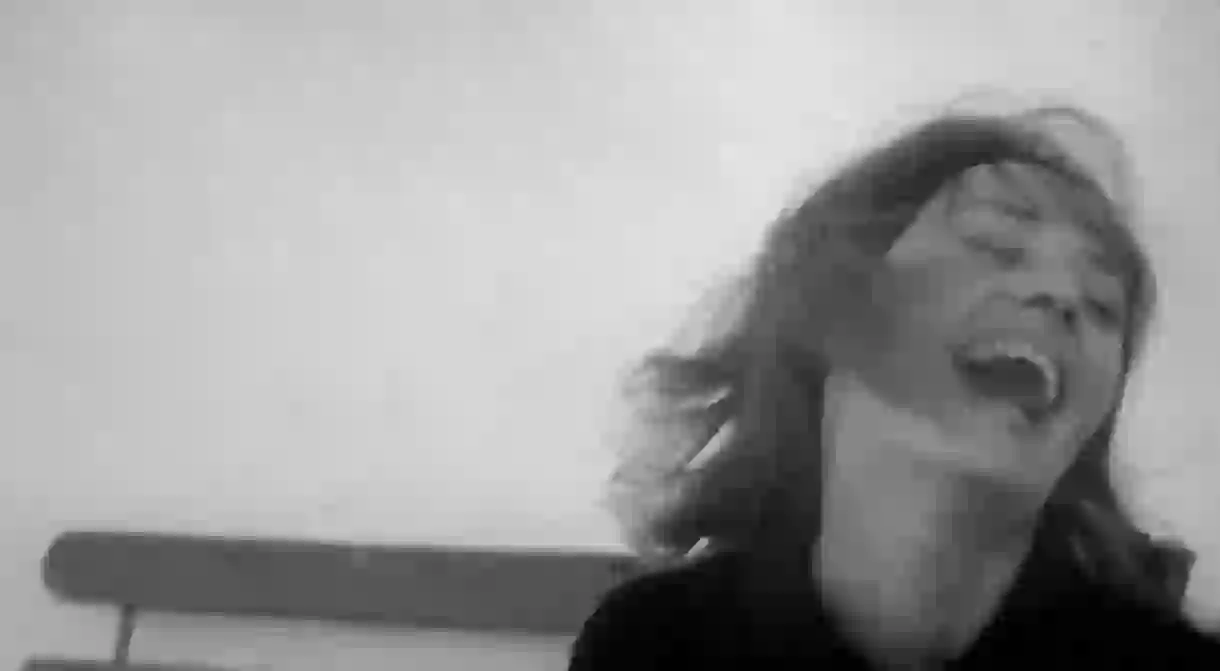17 Films That Make Jeanne Moreau "Immortelle"

Jeanne Moreau’s death on July 31 set a seal on a transitional period for European womanhood. Twenty-one years old when Simone de Beauvoir’s The Second Sex was published in 1949, Moreau proceeded to live on-screen the kind of independent life the author believed modern women ought to live. No one can deny she did it tempestuously—but what a legacy she left.
A fixture on the list of the greatest film actresses of all time, Jeanne Moreau rubs shoulders with Lillian Gish, Greta Garbo, Marlene Dietrich, Bette Davis, Katharine Hepburn, Barbara Stanwyck, Anna Magnani, Ingrid Bergman, and Meryl Streep.
Moreau’s sister in embattlement and antagonism is Davis. Both could be bullies, both could be scathing and destructive. But the societies (and social restraints) against which each star’s ravenous femininity chafed were radically different.
Davis’s terrain was that of the Hollywood melodrama—the pre-liberated woman’s picture, which set the goals of a career, marriage, and survival.

As a defining presence for both French second-wave feminism and the nouvelle vague era, Moreau was more freely sexual than her English-speaking peers. Hollywood in the late 1950s and early 1960s still nervously categorized women as virgins (Doris Day, Audrey Hepburn, Natalie Wood) or whores (Elizabeth Taylor, Marilyn Monroe, Jayne Mansfield). Those insulting archetypes didn’t really blend until Jane Fonda emerged.
The French being French, they made films that celebrated women’s sexuality. The exploitation of the very willing Brigitte Bardot found a powerful antidote in Moreau. Her persona was harsh, sullen, lusty, earthy, sybaritic, voracious. In Joseph Losey’s Eva and François Truffaut’s Jules et Jim, she was emasculating. The courtesan she played in Eva is monstrous.

Moreau portrayed women who made their own rules (as she herself was wont to do). They smoked, drank, and slept around. They were neither pretty nor pliant, but hard-edged and demanding, and all the more erotic for not being pouting sex kittens like Bardot’s characters. Louis Malle ill-advisedly teamed the two actresses as chalk and cheesecake on Viva Maria! (1965); he served Moreau much better in Elevator to the Gallows and The Lovers (both 1958).
Taking their pleasures on the run, Moreau’s characters were creations of social flux, which is why so many of her key films have a tragic or fatalistic lilt. They did not always reward her characters for acting on their passions, hungers, and material desires. Hers is an uneasy body of work, but it speaks truth to love especially, so would we have it any other way? Thank you, Mme. Moreau, for everything.
Elevator to the Gallows (1958)
Louis Malle cast Moreau as the murderous adulteress Florence in the foreboding Elevator to the Gallows after he saw her on stage in Cat on a Hot Tin Roof.

Les Amants (1958)
Malle’s Les Amants, which was acquitted on an obscenity charge when it was shown in Ohio, stars Moreau as a woman who discards her preoccupied husband and polo-playing lover for an attentive younger man.
Les Liaisons Dangereuses (1959)
In Roger Vadim’s louche update of Les Liaisons Dangereuses, Moreau plays Juliette de Merteuil opposite Gérard Philipe’s Valmont.

Moderato Cantabile (1960)
In Peter Brook’s Moderato Cantabile (aka Seven Days… Seven Nights), based on a Marguerite Duras novel, Moreau portrays a rich, bored, and unstable woman who becomes involved with a fellow witness (Belmondo) to a murder.

La Notte (1961)
Michelangelo Antonioni’s La Notte stars Moreau as Lidia, who is alienated from her successful author husband (Marcello Mastroianni) and tormented by the imminent death of a former admirer friendly with them both. Monica Vitti plays a woman briefly tempted by Mastroianni’s character.
Eva (1962)
A femme fatale for the ages, Moreau’s Eva is a callous, unsmiling prostitute who puts a phony Welsh author (Stanley Baker) into a humiliating erotic bind in Venice.
Jules et Jim (1962)
François Truffaut’s new wave classic made Moreau’s Catherine the mercurial center of the most famous ménage à trois in art-house history.
La Baie des Anges (1962)
In Jacques Demy’s La Baie des Anges, Moreau plays the unapologetic gambling addict Jackie—a divorcee with a child she neglects—who captivates a young bank clerk in Nice.

The Trial (1962)
In Orson Welles’s The Trial, based on the Kafka novel, Moreau is magnetic as Fraülein Bürstner, the seductive neighbor of Anthony Perkins’s Josef K.

Diary of a Chambermaid (1964)
Moreau plays conniving maid Céléstine in Luis Buñuel’s bourgeois-skewering Diary of a Chambermaid. Georges Géret is the murderous groom Joseph,

Chimes at Midnight (1966)
Moreau plays Doll Tearsheet and Orson Welles is Falstaff in Welles’s Chimes at Midnight.

The Bride Wore Black (1968)
Moreau’s character, Julie Kohler, sets out to kill the five men who accidentally slew her bridegroom in François Truffaut’s Hitchcock homage, The Bride Wore Black.

Immortal Story (1968)
Moreau plays Virginie Ducrot, a woman in Macao seeking revenge on the dying merchant (Orson Welles) who ruined her father, in Welles’s The Immortal Story.

Nathalie Granger (1972)
The character Moreau plays in Marguerite’s minimalist drama Nathalie Granger (1972) receives a phone call and says to the wrong-caller, “There is no telephone here, madame.”

Querelle (1982)
In Rainer Werner Fassbinder’s stylized gay classic Querelle, his last film, Moreau played the Brest brothel-keeper, Lysiane.

Balzac: A Passionate Life (1999)
In Josée Dayan’s four-hour television drama, Moreau excels as Anne-Charlotte Laure, the vicious, withholding mother of the novelist Honoré de Balzac (Gérard Depardieu).
Cet Amour-là (2003)
Dayan’s Cet Amour-là depicts the May-December romance of novelist and experimental filmmaker Marguerite Duras and Yann Andréa (Aymeric Demarigny). Duras herself had directed Moreau three decades earlier in Nathalie Granger (above).














